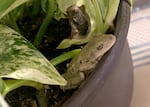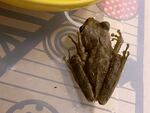A potentially invasive Cuban tree frog was found Monday on a plant sold at a tropical plant store in the Beaverton area.
This is the second time in the last few years the Oregon Department of Fish and Wildlife has learned of this type of frog entering the state.
In 2021, two Cuban tree frogs were discovered on nursery plants in the Eugene area.

In this provided photo, a Cuban treefrog (Osteopilus septentrionalis) was found on a tropical plant, sold at a store in Beaverton in February 2023. The frog reproduces quickly and monopolizes food sources and habitats, threatening native frog species. They also secrete a mucus that causes allergy-like symptoms.
Courtesy of Oregon Department of Fish and Wildlife
Rick Boatner, ODFW’s invasive species supervisor, said the department determines a foreign species’ threat level based on a number of factors.
“Such as, could they survive in Oregon? Can they harm other native wildlife?” Boatner said. “And with the Cuban treefrog, we do not believe it would survive, or it’s a low risk of surviving, in Oregon.”
The warm weather amphibian would likely not make it through an Oregon winter according to Boatner. However, in the summer, the frogs could wreak havoc.
“This particular species of treefrog is a threat to native frogs and other amphibians in Oregon,” Boatner said. “In places where Cuban treefrogs have become established, such as in Florida, they can quickly reproduce and out-compete native frog species for food or space.”

In this provided photo, a Cuban treefrog (Osteopilus septentrionalis) was found on a tropical plant, sold at a store in Beaverton in February 2023. The frog reproduces quickly and monopolizes food sources and habitats, threatening native frog species. They also secrete a mucus that causes allergy-like symptoms.
Courtesy of Oregon Department of Fish and Wildlife
Fish and wildlife officials say all plant retailers and customers should inspect plants and contact wildlife officials if frogs or any other species are found “hitchhiking.”
Any animal or insect can be reported to the Oregon Invasive Species hotline by calling 1-866-INVADER or visiting https://oregoninvasiveshotline.org.
